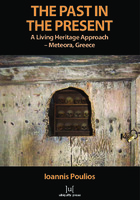The Past in the Present
A Living Heritage Approach - Meteora, Greece
| dc.contributor.author | Poulios, Ioannis | |
| dc.date.accessioned | 2015-12-31 23:55:55 | |
| dc.date.accessioned | 2019-03-04 09:33:06 | |
| dc.date.accessioned | 2020-04-01T14:36:33Z | |
| dc.date.available | 2020-04-01T14:36:33Z | |
| dc.date.issued | 2014 | |
| dc.identifier | 533913 | |
| dc.identifier | OCN: 896151708 | en_US |
| dc.identifier.uri | http://library.oapen.org/handle/20.500.12657/33207 | |
| dc.description.abstract | The Past in the Present deals with the complexities in the operation and management of living heritage sites. It presents a new interpretation of such sites based on the concept of continuity, and its evolution to the present. It is demonstrated that the current theoretical framework and practice of conservation, as best epitomised in a values-based approach and the World Heritage concept, is based on discontinuity created between the monuments (considered to belong to the past) and the people of the present, thus seemingly unable to embrace living heritage sites. From this position, the study suggests an innovative approach that views communities and sites as an inseparable entity: a Living Heritage Approach. This approach brings a new insight into key concepts such as authenticity and sustainable development. Through the use of the monastic site of Meteora, Greece, as a case study, the discussion generated aims to shift the focus of conservation from ‘preservation’ towards a continual process of ‘creation’ in an ongoing present, attempting to change the way heritage is perceived, protected and, more importantly, further created. “The Past in the Present is an important and much-needed contribution to the debate about living heritage – and it is particularly significant in the context of the heritage of the past in the modern world. Anyone concerned with how the past is, or should be, integrated within modern lives and identities will need to read this book.” – Leslie Brubaker, Director, Centre for Byzantine, Ottoman and Modern Greek Studies, University of Birmingham, UK. “This interesting and thoroughly researched book by Ioannis Poulios is a useful tool in promoting the Living Heritage Approach, and provides a sound theoretical basis for future work. Living Heritage Approach is a paradigm shift that suggests a new way of addressing conservation for our heritage. ICCROM is proud to have introduced this approach, also with the contribution of Ioannis.” – Gamini Wijesuriya, Project Manager, ICCROM. (DOI: http://dx.doi.org/10.5334/bak) | |
| dc.language | English | |
| dc.subject.classification | thema EDItEUR::G Reference, Information and Interdisciplinary subjects::GL Library and information sciences / Museology::GLZ Museology and heritage studies | en_US |
| dc.subject.classification | thema EDItEUR::J Society and Social Sciences | en_US |
| dc.subject.other | living heritage approach | |
| dc.subject.other | iccrom | |
| dc.subject.other | conservation | |
| dc.subject.other | world heritage | |
| dc.subject.other | community participation | |
| dc.subject.other | sustainable development | |
| dc.subject.other | meteora | |
| dc.subject.other | greece | |
| dc.subject.other | living heritage | |
| dc.subject.other | authenticity | |
| dc.subject.other | monastic site | |
| dc.subject.other | Divine Liturgy | |
| dc.subject.other | Eastern Orthodox Church | |
| dc.subject.other | God | |
| dc.subject.other | Tourism | |
| dc.title | The Past in the Present | |
| dc.title.alternative | A Living Heritage Approach - Meteora, Greece | |
| dc.type | book | |
| oapen.identifier.doi | 10.5334/bak | |
| oapen.relation.isPublishedBy | d5069e3b-8e22-4e18-9d2d-558a5f96d506 | |
| oapen.relation.isbn | 9781909188280;9781909188297 | |
| oapen.pages | 180 | |
| oapen.remark.public | Relevant Wikipedia pages: Divine Liturgy - https://en.wikipedia.org/wiki/Divine_Liturgy; Eastern Orthodox Church - https://en.wikipedia.org/wiki/Eastern_Orthodox_Church; God - https://en.wikipedia.org/wiki/God; Greece - https://en.wikipedia.org/wiki/Greece; Meteora - https://en.wikipedia.org/wiki/Meteora; Monastery - https://en.wikipedia.org/wiki/Monastery; Monasticism - https://en.wikipedia.org/wiki/Monasticism; Tourism - https://en.wikipedia.org/wiki/Tourism; World Heritage Site - https://en.wikipedia.org/wiki/World_Heritage_Site |

